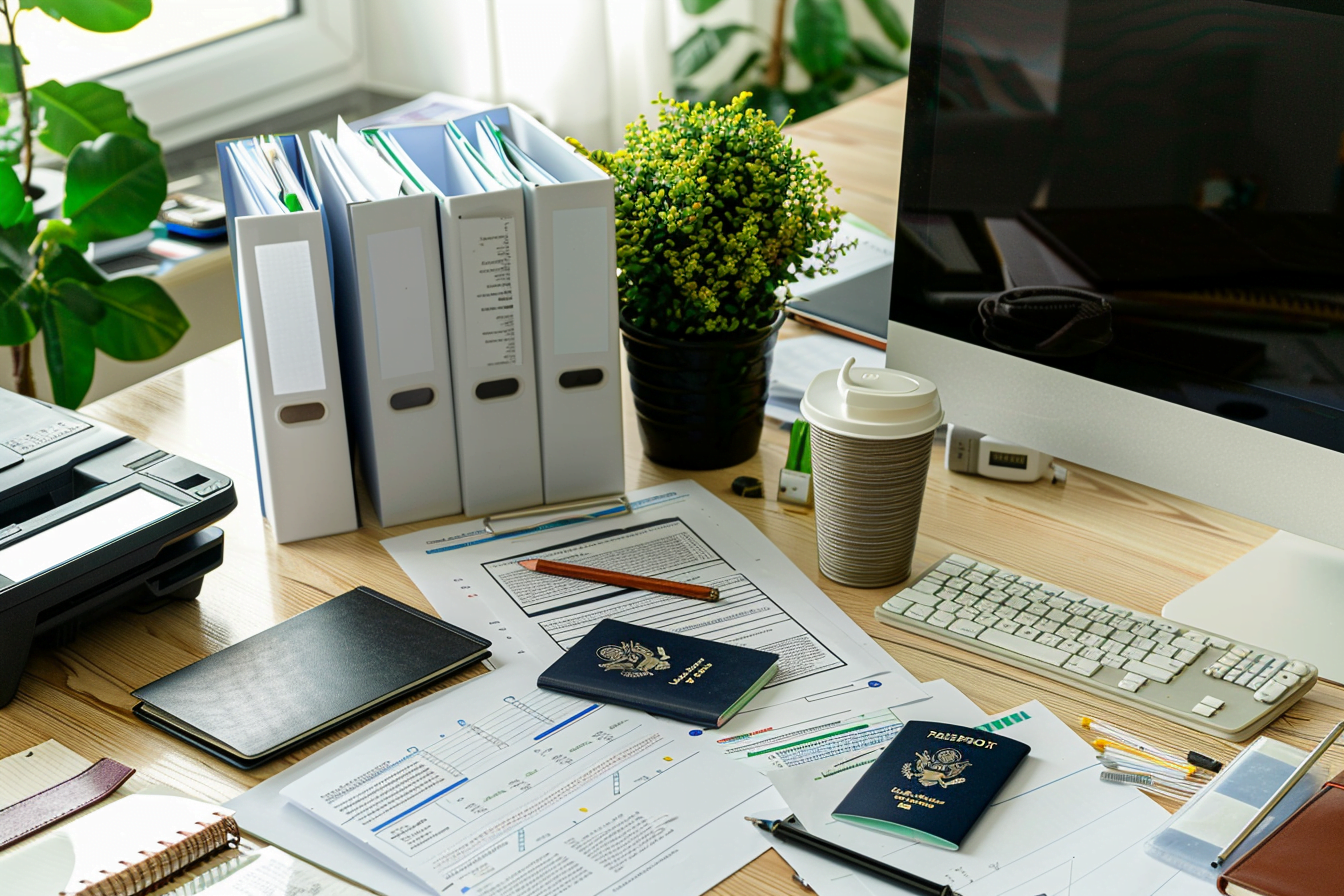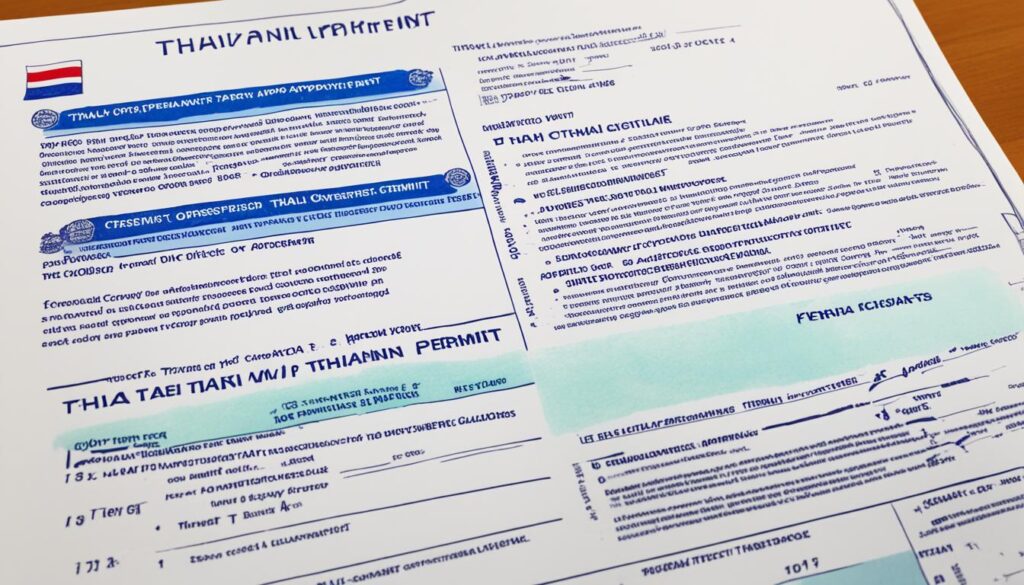Discover the essentials of meeting legal requirements for working in Thailand with our comprehensive guide to work permits, visas, and labor laws.
In 2021, Thailand’s Ministry of Labor reported over 3 million foreign workers within its vibrant economy—a surprising number that underscores the nation’s magnetic appeal for international talent and the vital importance of adhering to the legal requirements for working in Thailand. Whether it’s the allure of bustling Bangkok or the serene beaches of Phuket that draws you in, the path to employment here involves a critical two-step process: securing both a work visa from your home country and a work permit upon arrival. The distinction between these two documents is crucial: a work visa is your entry ticket into Thailand for employment purposes, while a work permit is the government’s authorization for you to actually hold a job in the country. Navigating the Thailand work permit application is no walk in the park, but with the right information, you can smoothly sail through the bureaucratic waves and be compliant with Thailand’s work authorization framework.
Key Takeaways
- A work visa and work permit are mandatory for legally working in Thailand.
- Thai work permit application involves coordination between the individual and the employer.
- Work authorization in Thailand is enforced with strict legal repercussions for non-compliance.
- There are multiple visa types tailored to different professional circumstances.
- A thorough understanding of the legal requirements for working in Thailand ensures compliance and avoids penalization.
The Distinction Between Work Visa and Work Permit in Thailand
The journey to employment in Thailand for foreign workers involves navigating two critical types of documentation: a work visa and a work permit. Understanding the specific function and requirement for each is essential for legal work status in Thailand.
Understanding the Difference
To commence their careers in the Land of Smiles, foreign workers in Thailand must first distinguish between a work visa and a work permit. A work visa Thailand is an official stamp in your passport, granted by a Thai embassy or consulate prior to your arrival in the country, which categorically acknowledges your intent to work. Following this, obtaining a work permit Thailand is a mandatory step as it legalizes the type and location of your employment once you are in the country.
Types of Work Visas and Their Purpose
Thailand’s Immigration Bureau offers several types of work visas, each designed to fit different professional circumstances:
- Non-Immigrant B Visa: For foreigners employed or conducting business in Thailand.
- Non-Immigrant B-A Visa: Specially tailored for foreign investors who meet certain conditions set by Thai authorities.
- Non-Immigrant IB Visa: Issued to foreign investors in conjunction with the Board of Investment of Thailand (BOI).
- Non-Immigrant M Visa: For foreign media correspondents and journalists authorized by their home countries.
- Smart Visa: A unique visa category targeting high-skilled professionals, startups, and investors in select industries, which uniquely does not require a separate work permit.
Securing a Work Permit Post Arrival
Upon arrival in Thailand with the appropriate work visa in hand, the next crucial step involves the application for a work permit. This document is obtained through the Ministry of Labor and verifies the legality of the foreigner’s occupation, work conditions, and the specific employer in Thailand.
To ensure compliance with Thai labor laws, the process must be thorough and accurately reflect both the employer and the employee’s details. Without a work permit, a foreign national’s ability to work would be unauthorized, leading to potential legal repercussions.
| Document | Purpose |
|---|---|
| Work Visa | Entrance endorsement for employment purposes |
| Work Permit | Legal authorization to engage in a job in Thailand |
| Smart Visa | For high-skilled professionals with work permit exemption |
It is pivotal for employers hiring foreign workers in Thailand to support them through these processes, as any non-compliance could have serious implications for both the individual and the company.
Legal Requirements for Working in Thailand
For those seeking employment in Thailand, understanding the work permit process Thailand is essential. The country’s employment regulations stipulate a series of legal steps and requirements that both employers and employees must adhere to. These are framed by both the Thai Employment Law and the Foreign Business Act, which together ensure the legality of foreign workers within the nation.
The process is two-fold, requiring action from both the hiring entity and the incoming worker. Employers must justify the employment of foreigners over Thai nationals by meeting certain conditions, while workers must present credible qualifications and background to obtain their work permits.
- Company Eligibility
- Number of Thai employees
- Minimum capital investment
- Compliance with tax and tech certification requirements
- Individual Requirements
- Valid qualifications and experience
- Health and background checks
- Possession of a Non-Immigrant Visa
- Document Submission
- Application form with both employer and employee details
- Educational certificates and professional references
- Evidence of fulfilling the legal requirements for working in Thailand
It is critically important to ensure that all paperwork submitted is accurate and comprehensive. Errors or omissions can cause delays or rejections, impacting the legal status of foreign employees in Thailand.
| Document | Required by Employer | Required by Employee |
|---|---|---|
| Application Forms | Yes | Yes |
| Company Registration | Yes | No |
| Educational Certificates | No | Yes |
| Professional References | No | Yes |
| Tax Documents | Yes | No |
| Health Certificates | No | Yes |
Exemptions do exist, particularly for companies promoted by the Board of Investment (BOI) in Thailand. These entities benefit from more lenient criteria and a streamlined application procedure, emphasizing Thailand’s commitment to fostering business development and innovation within the country. To successfully navigate the work permit process Thailand, both employers and potential employees must ensure they are well-informed and fully prepared to meet the legal requirements for working in Thailand.

The effort invested in complying with the legalities of employment in Thailand can lead to a mutually beneficial relationship between foreign talent and local enterprise, enhancing the country’s global economic standing. By understanding and respecting the employment regulations Thailand has in place, businesses can harness international expertise while maintaining legal integrity.
Comprehensive Overview of Thailand Work Visa Options
Thailand’s diverse visa options provide international workers and entrepreneurs with tailored opportunities to pursue career and business objectives within its borders. Understanding the intricacies of each visa category ensures that applicants can make informed decisions about their immigration status and subsequent employment in Thailand.
Non-immigrant Visas: The Pathway to Employment
For those seeking employment or conducting business in Thailand, the Non-immigrant B Visa serves as a foundational entry point. This visa extends to various types of professionals, including teachers, artists, and skilled workers, facilitating their legal employment journey in the country. The work visa Thailand landscape is designed to match the varied and dynamic needs of the global workforce.
Business and Investment Visas: Tailored for Entrepreneurs
Entrepreneurs and investors looking at Thailand for business expansion have access to specialized visas. The Non-immigrant B Visa category encompasses the B-A and Non-immigrant IB Visa, providing a strategic gateway for foreign investors and those engaged with businesses that align with the Board of Investment (BOI) promotions. These visas serve as critical tools for injecting foreign expertise and capital into the Thai economy.
Smart Visa: Attracting Highly-Skilled Professionals
The Smart Visa program illustrates Thailand’s commitment to innovation and talent attraction. Aimed at high-level executives, researchers, startup entrepreneurs, and those in the technology sector, the Smart Visa provides privileges like extended stays and exemptions from typical work permit requirements, highlighting Thailand’s intent to become a hub for high-skilled professionals.
Applicants often weigh the benefits of diverse visa types against their specific circumstances. The following table compares key attributes of these visa options:
| Visa Type | Target Group | Stay Duration | Work Permit Required | Special Features |
|---|---|---|---|---|
| Non-immigrant B Visa | Foreign employees/business operators | 1 year (renewable) | Yes | Wide application across professions |
| Non-immigrant IB Visa | Foreign investors/BOI-promoted projects | 1-3 years (renewable) | Yes, with streamlined process for BOI investors | Intended for investment-related activities |
| Smart Visa | Highly-skilled professionals/startup entrepreneurs | Up to 4 years | No, in certain industries | Facilitates long-term stay and benefits for families |
Choosing the correct type of visa is a critical step for successful employment and business endeavors in Thailand. Whether it’s the flexibility of the Non-immigrant B Visa, the investor-centric Non-immigrant IB Visa, or the tech-savvy Smart Visa, Thailand extends a warm welcome to those who contribute to its economic growth and global connectivity.
Understanding Thai Work Permit Prerequisites
Entering Thailand’s labor market as a foreign national means navigating the intricate framework of Thai labor laws. Both employers and potential employees need to be thoroughly acquainted with the specific prerequisites mandated for a Thailand work permit application. A clear comprehension of these requirements not only facilitates legality but also ensures a frictionless integration into Thailand’s professional environment.
Qualifications and Criteria for Foreign Workers
Foreign individuals aiming to build their careers in Thailand must initially demonstrate their eligibility. This is assessed through a rigorous inspection of their educational background, work experiences, and professional capabilities. These qualifications ensure compliance with the high standards set by the Thai Ministry of Labor to uphold the local workforce quality.
- Minimum education level: Bachelor’s degree or equivalent
- Relevant work experience in the proposed employment field
- Health insurance coverage as prescribed by Thai regulations
- Non-criminal record, both locally and in the country of origin

Company Requirements for Sponsoring Work Permits
Thailand’s businesses that intend to employ foreign nationals must fulfill certain criteria to establish themselves as eligible sponsors for work permits. These criteria include but are not limited to, the statutory number of Thai employees, registered capital sufficiency, and adherence to tax obligations, ensuring that the enterprises are contributing significantly to the national economy and workforce.
| Requirement | Details |
|---|---|
| Thai National employees | Minimum of four Thai nationals to one foreign worker |
| Capital Registration | Minimum of 2 million baht per foreign employee |
| Tax and VAT Compliance | Regular submission of tax and VAT returns |
| Technology Certification | Relevant licenses for tech-related entities |
Exemptions for BOI-Promoted Companies
BOI-promoted companies in Thailand enjoy a privileged position when it comes to sponsoring work permits for foreign workers. Thanks to their pivotal role in advancing technology, innovation, and economic growth, these entities can benefit from relaxed criteria, particularly in terms of capital registration and the ratio of Thai to foreign employees, providing significant incentives for international talents to join these pioneering firms.
- Reduced capital registration requirements
- Flexibility in the ratio of Thai to foreign employees
- Streamlined work permit processing
Navigating the Thai Work Permit Application Procedure
Navigating through the intricate maze of working visa requirements, Thai labor laws, and the work permit process in Thailand is a crucial step for any professional aspiring to work in the country. The journey kicks off with obtaining the correct Non-Immigrant Visa from a Thai Embassy, a process that necessitates foresightedness and an understanding of the requirements before setting foot in the Land of Smiles.

Upon arriving in Thailand, the clock starts ticking on a 90-day countdown within which the work permit application needs to be completed. A rigorous collection of documents is required, including but not limited to identification papers, educational credentials, and proof of employment eligibility. Here’s a glance at what candidates need to prepare:
| Document | Description | Notes |
|---|---|---|
| Passport | A valid passport with entry stamp | Ensure at least 6 months validity |
| Educational Credentials | Degree certificates relevant to your employment | Certificates may require legalization |
| Employment Offer | Job offer from a Thai company | Must specify position and remuneration |
| Photos | Recent passport-sized photographs | Typically four (4×6 cm) |
The official approval times can extend or contract, influenced by factors like applicant backlog and regional discretion. This phase can be notably smoother for applicants engaged with BOI-promoted companies, who may have their work permit expedited through Thailand’s One-Stop Service Center, a facility designed to streamline bureaucratic affairs for prioritized businesses and their personnel.
Compliance with Thai labor laws is not only about submitting paperwork; it’s about punctuality, meticulousness, and an awareness of the legal landscape cultivating your career prospects in Thailand. Efficiently navigating the work permit process Thailand offers, ensures a solid foundation for success in the professional realm of Southeast Asia.
Legal Obligations and Restrictions for Foreign Workers
When it comes to working in Thailand, foreign workers are subject to distinct legal obligations and restrictions that are essential for maintaining their work authorization and legitimacy in the country. These regulations, rooted in Thai labor laws, are designed to ensure a fair and organized labor market while protecting the rights and interests of both the employees and the employers.
Restrictions on Employment and Types of Work
One of the key limitations that foreign workers in Thailand must heed strictly involves the stipulations of their work permits. Employment is legally permitted only with the employer and within the job designation specified on the work permit. Engaging in any job or for any employer not explicitly mentioned can lead to severe penalties. To illustrate these constraints, here’s a simple guide to understand the permissible work scope:
| Permit Details | Legally Permitted Actions | Prohibited Actions |
|---|---|---|
| Employer as stated on the permit | Work exclusively for the listed employer | Working for a different employer or self-employment |
| Job Position | Perform duties of the specified position | Undertaking jobs beyond the role mentioned |
| Work Location | Work within the designated premises/location | Working outside the agreed-upon place of business |
Mandatory Reporting and Tax Considerations
Keeping up with reporting and tax obligations is pivotal for foreign workers in Thailand. A regular update of their residence status to the immigration office every 90 days is required. Moreover, the acquisition of a tax identification number is crucial for income tax filing in Thailand, which is an annual commitment. Here’s a snapshot of what foreign workers need to remember for compliance:
- Obtain a tax ID number from the Revenue Department.
- Submit tax returns and payment prior to the March 31st deadline annually.
- Keep comprehensive records of income and tax deductions.
- Report to the nearest Immigration office every 90 days.
Understanding Penalties for Non-Compliance
Adhering to Thai labor laws is not optional but a mandatory practice to avoid punitive measures. Foreign workers who fail to comply with work restrictions or neglect their tax and reporting duties can face drastic consequences, ranging from monetary fines to deportation or incarceration. Awareness and understanding of these penalties are essential for all foreign workers in Thailand to prevent legal infractions:
- Fines for minor breaches of work permit stipulations.
- Revocation of the work permit for repeated violations.
- Deportation back to the home country for severe non-compliance.
- Incarceration in case of deliberate disregard for employment laws.
Conclusion
In summary, the journey to securing proper work authorization in Thailand is multi-faceted, necessitating acute awareness of the differences between work visas and work permits, as well as a comprehensive understanding of the distinct requirements for employers and foreign employees alike. Delving into the legal requirements for working in Thailand lays the groundwork for a rewarding professional experience, provided all regulations are diligently followed. To this end, the Thailand work permit application process stands as a testament to the country’s organized approach to managing its foreign workforce.
Summarizing the Pathway to Work Legally in Thailand
The pathway to legality in the Thai workforce is clear-cut yet demands attention to detail. Ensuring compliance starts from pre-arrival preparation – distinguishing between the visa necessary for entry and the permit required for work. It extends through the careful compilation of documentation, adherence to the criteria for eligibility, and the successful navigation of the application process itself. Maintaining legality goes beyond mere acquisition of the permits; it encompasses a consistent adherence to employment regulations in Thailand, safeguarding one’s ability to work within the country’s legal framework.
Final Tips for Compliance with Thai Employment Regulations
For continuous legal employment in Thailand, foreign workers should remain vigilant about fulfilling their reporting duties, managing their tax responsibilities, and understanding the limitations of their work permit provisions. Adhering to employment regulations in Thailand wards off the possibility of severe penalties and confirms the foreign worker’s commitment to respecting the country’s labor laws. A vigilant and informed approach ensures that foreign professionals can contribute to and benefit from Thailand’s dynamic work environment while upholding the legal requirements for working in Thailand.
FAQ
What is the difference between a work visa and a work permit in Thailand?
A work visa is a document issued by the Thai Embassy or Consulate before you enter Thailand, which allows you to stay in the country for employment purposes. On the other hand, a work permit is an authorization given by Thailand’s Ministry of Labor once you are in Thailand, giving you the legal right to work.
What types of work visas are available for Thailand?
Thailand offers several Non-Immigrant Visa options for working individuals, including the Non-Immigrant B Visa for employment, B-A and IB Visas for investors, and the Smart Visa for high-skilled professionals, which includes a work permit exemption for qualifying applicants.
What are the prerequisites for obtaining a Thai work permit?
The prerequisites for a Thai work permit include holding an appropriate visa, meeting specific qualifications such as educational level, and relevant work experience. Employers must also comply with certain requirements such as having a specified number of Thai employees, meeting capital registration conditions, and being up-to-date with tax and VAT payments.
Are there any exemptions for companies under the Board of Investment (BOI) when obtaining work permits for their foreign workers?
Yes, companies promoted by the BOI are subject to certain exemptions and privileges, including a streamlined work permit process, allowing for a faster and more efficient application procedure for their foreign employees.
What is the process for applying for a work permit in Thailand?
The process for applying for a Thai work permit involves entering Thailand on the appropriate Non-Immigrant Visa, then compiling and submitting the necessary documentation, such as passport, visa, educational certificates, and proof of employment, to the Ministry of Labor within 90 days of visa issuance.
What legal restrictions must foreign workers abide by once they have a Thai work permit?
Foreign workers are only authorized to work in the position and for the employer stated on their work permit. They must also report their address to the Immigration Bureau every 90 days and register for a tax identification number for income tax filing purposes.
What are the penalties for non-compliance with Thai work permit regulations?
Non-compliance can lead to serious consequences including fines, imprisonment, or deportation. It’s crucial for foreign workers to strictly adhere to the scope of work, reporting, and tax obligations stipulated by their work permits and Thai laws.
How can one ensure compliance with Thai employment regulations?
To ensure compliance, foreign workers in Thailand must acquaint themselves with the country’s labor laws, adhere to their visa and work permit conditions, fulfill reporting and tax requirements, and follow any additional guidelines from their employers and the Thai Ministry of Labor.






Leave a reply